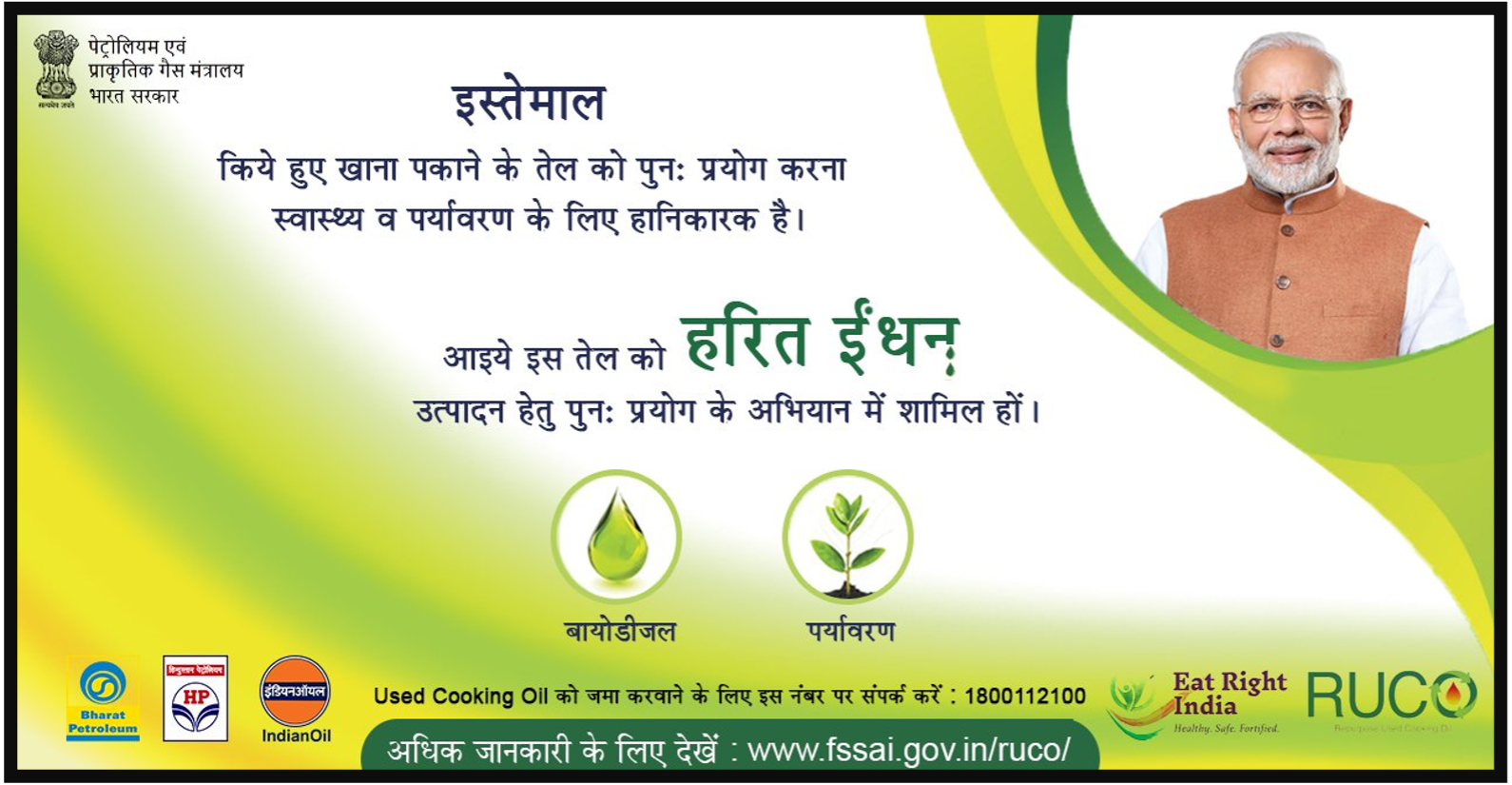Introduction;
The FSSAI RUCO (Repurpose Used Cooking Oil) initiative is an effort by the Food Safety and Standards Authority of India (FSSAI) to address the issue of used cooking oil.
The objective of the RUCO initiative is to promote the collection, conversion, and processing of used cooking oil into bio-diesel. Used cooking oil, when improperly disposed of, can pose health hazards as it is often recycled or finds its way back into the food chain. It can also lead to the blockage of sewage systems and cause environmental pollution.
Under the RUCO initiative, the FSSAI encourages various stakeholders, such as food businesses, food delivery aggregators, and oil collection agencies, to collaborate and establish a sustainable ecosystem for the collection and conversion of used cooking oil.
The collected used cooking oil is then processed by authorized bio-diesel manufacturers to produce bio-diesel, which can be used as a cleaner and more eco-friendly fuel.

The initiative aims to achieve the following goals:
1. Encourage food businesses to dispose of used cooking oil in an environmentally friendly manner.
2. Create a transparent and traceable system for the collection and processing of used cooking oil.
3. Promote the use of bio-diesel derived from used cooking oil as an alternative to fossil fuels.
4. Ensure the quality and safety of the collected used cooking oil and the resulting bio-diesel.
The FSSAI provides guidelines and standards for the collection, storage, transportation, and processing of used cooking oil. It also works on building partnerships with various stakeholders, including government agencies, industry associations, and non-governmental organizations, to create awareness and facilitate the implementation of the RUCO initiative.
The RUCO initiative not only contributes to reducing environmental pollution and promoting sustainable practices but also supports the development of the bio-diesel industry in India, thereby reducing the country’s dependence on fossil fuels.
FSSAI action against Re-use of oil for food frying.
As per scientific studies it has been notified the limit of Total Polar Compound beyond 25 per cent is considered unfit for human consumption. Total Polar Compound is used to measure the quality of oil, and its level increases every time oil is re-heated.




The key features of the RUCO scheme include:
1. Collection Network: FSSAI encourages the establishment of a robust collection network for used cooking oil. This involves collaboration between various stakeholders, including food businesses, cooking oil suppliers, aggregators, and authorized collection agencies. The aim is to ensure the efficient and safe collection of used cooking oil from different sources.
2. Quality Assurance: The scheme emphasizes the importance of maintaining the quality and safety of used cooking oil. FSSAI provides guidelines and standards for the collection, storage, and transportation of used cooking oil to prevent contamination and ensure its suitability for further processing.
3. Authorized Bio-diesel Manufacturers: FSSAI identifies and authorizes bio-diesel manufacturers who can convert the collected used cooking oil into bio-diesel. These authorized manufacturers follow specific protocols and quality standards to ensure the production of high-quality bio-diesel.
4. Sustainable Utilization: The RUCO scheme promotes the utilization of bio-diesel derived from used cooking oil as an eco-friendly alternative to conventional fossil fuels. It aims to create a market for bio-diesel and encourage its use in transportation, industrial, and agricultural sectors.
5. Awareness and Capacity Building: FSSAI conducts awareness programs and capacity-building initiatives to educate stakeholders about the importance of proper disposal of used cooking oil and the benefits of bio-diesel. These efforts aim to generate widespread participation and support for the RUCO scheme.
The RUCO scheme aligns with the government’s broader objectives of reducing environmental pollution, promoting sustainable practices, and enhancing energy security through the utilization of renewable resources. It not only addresses the health risks associated with the reuse of used cooking oil but also contributes to the development of a circular economy by transforming waste into a valuable resource.
Impact of RUCO initiative
RUCO will help bring:
1) Health benefits by avoiding ill effects of UCO or used cooking oil.
2) Employment generation and economic growth of the nation.
3) Infrastructural investment in Rural Areas of the country.
4) Cleaner environment with reduction of carbon footprint
5) Reduction of import dependency (Palm Stearin) from other country.
6) RUCO will also help promote a shift towards a circular economy model from linear Economy with health, environmental and economic benefits.

